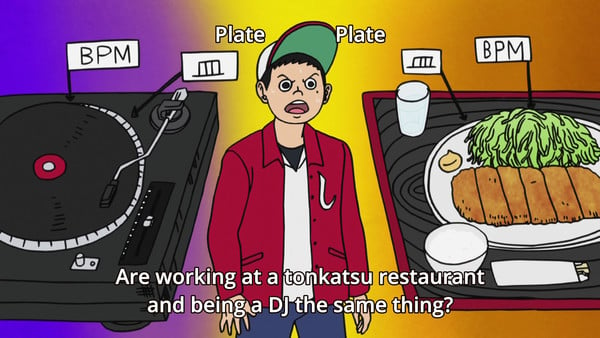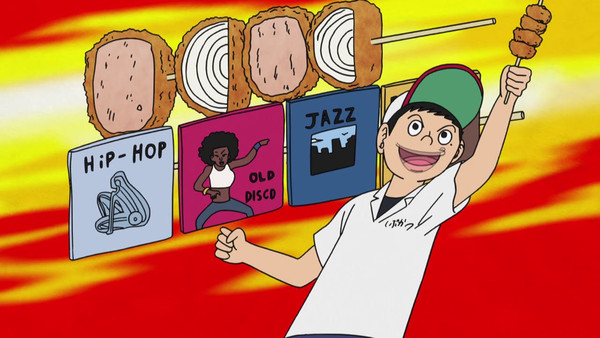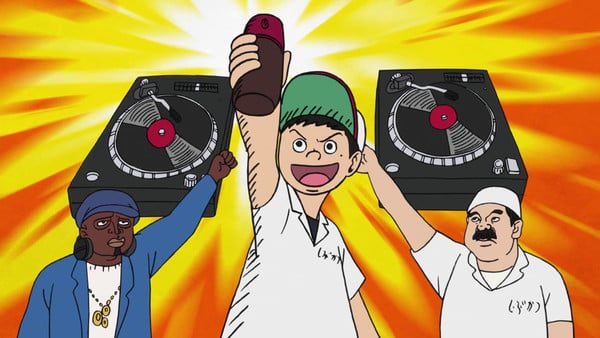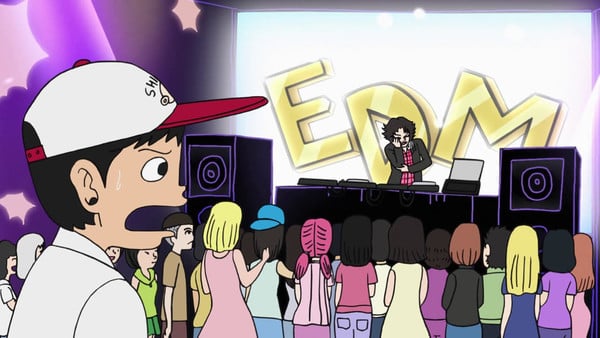Tonkatsu DJ Agetarou: The Best Anime About Being an Artist
by Norbert Daniels Jr.,
Did you know that being a DJ and being a chef are the same thing? That's the premise of Tonkatsu DJ Agetarō. Agetarou is a third-generation chef at his family's tonkatsu restaurant in Shibuya. When a late-night delivery takes him to the city's hottest nightclub, he sees his first live DJ performance and becomes smitten. Noticing the similarities between the DJ working the turntable and his father working the fryer, two passions awake in him, and he makes a dual commitment to both his family's craft and to the path of the DJ. This musical anime is amazing in so many ways, but what makes it most special is what it says about what it takes to be an artist.
Linking together DJ'ing and tonkatsu-cooking may be a stretch, but that's the kind of grasping for connections that all great artists need. To make great art you need to take inspiration from everywhere and anywhere. Agetarou finds material for his art everywhere: In the crackle of fryer oil at his restaurant. In a group of old men playing shogi in the park. In a woman listening to Korean dance music while cooking.

Tonkatsu DJ Agetarō encourages us each to find out what's meaningful and interesting to us in particular and channel that into our art. You can't make good anime by shutting yourself off to the rest of the world and only focusing on consuming anime. You need to immerse yourself in life and draw inspiration from all sources. Take Eureka Seven for example. How much less powerful a piece of art would it have been if the creators' only frame of reference was other mecha anime? What made that series so unique was the influence it took from real life. In addition to history, religion, and politics, Tonkatsu DJ Agetarō really shines with its incorporation of real-life EDM rave culture and surfer culture.
This is the same kind of advice that animation legend Chuck Jones preached. “Read everything. It doesn't do you much good to draw, unless you have something to draw and the only place you can get anything to draw is from out of that head and the only way you can exercise the mind is by bringing new ideas to it so it'll be surprised.”

Part of the process in becoming an artist is honing your skills and your taste. It can be daunting to look at other artists who are much more popular, or have command over a big variety of disciplines, but you shouldn't fret. Those are all things that come with time. In episode 6 Agetarou feels discouraged after performing with the DJ team Amakala as he realizes how far behind he is in the variety of music he plays. But he learns to not be impatient when he realizes the incredible amount of work it took to perfect his grandfather's sauce recipe. He applies that to his music, realizing that he'll get to where he wants as long as he keeps working at it.
Tonkatsu DJ Agetarō shows that honing your craft doesn't just mean working on your technical skills. In fact, that part is covered very quickly in a training montage. Honing your craft also means honing your taste. Learning exactly what you like and how that informs who you are as an artist. Finding your “rare groove” (a record that's not well-known but holds value to you) is very important.

In episode 8, when Agetarou feels like his music is getting shown up by the more trendy EDM genre, he almost falls into a trap. He decides he needs to also learn to play EDM, but his mentor DJ Oily points out to him that he's only looking at the chart-topping hits. Agetarou has to learn the balance between being open to new and popular things without letting them override his own taste. He finds this balance when he overhears a chef listening to Korean ppongjjak music on the radio and decides to incorporate it into his act. Not only does this win the crowd over, but it triggers something special in fellow DJ E. Dong Myeong. He breaks down in tears on the dance floor before dancing in appreciation because the song Agetarou plays triggers emotions of missing his mother back home in Korea. That's the kind of emotional resonance all artists should strive for.
Early in the series, Agetarou is motivated by a rivalry with the top DJ in his city, Yashiki, but that falls by the wayside pretty quickly. What really propels Agetarou forward isn't competition, but camaraderie. He owes his growth as an artist to forming friendships with his peers. So many artists get caught up in seeing their peers as competition, or regarding networking as a cynical opportunity to climb the ladder. That's not how to go about things. You need to form genuine human relationships with your peers and become part of a network of support for each other. Agetarou and his friends all grew from their mutual exchanges with each other, culminating in all of them uniting for a legendary performance at the Lard City party.
Your community also has to reach beyond your artistic peers. It's not just other DJs who helped Agetarou advance. It was his group of best friends. The guys who sold meat and wet towelettes to his family's restaurant. The freelance writer who wrote a magazine article about his very first performance. Everyone in your life is important to your development as an artist.
Tonkatsu DJ Agetarō packs an amazing amount of wisdom into its twelve 9-minute episodes. It's not just about music. It's not just about food. It's the story of how someone not only develops as an artist, but as a person.
Norbert Daniels Jr. is a freelance writer. You can see all his work on his website NorbertDanielsJr.com and follow him on Twitter @NorbertD96
discuss this in the forum (1 post) |